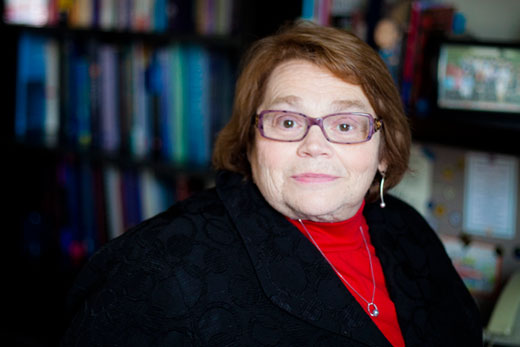Whether dealing with decisions about hormone replacement therapy, heart transplants, or end-of-life issues, Sarah Freeman has learned to listen to her patients. "Once I hear my patient's stories, everything starts to make perfect sense," says Freeman, the Betty Tigner Turner Clinical Professor of Nursing at the Nell Hodgson Woodruff School of Nursing. "Even research findings that I didn't anticipate."
As this year's recipient of the 2012 University Scholar/Teacher award, selected by Emory faculty on behalf of the United Methodist Church Board of Higher Education and Ministry, Freeman specializes in women's health and chronic disease management, and has been instrumental in establishing national accreditation for advanced practice nursing programs.
"Early on, I became convinced that treating people after they become sick was not the best way to go," Freeman says. "I want to give them the tools they needed to try to stay healthy or to manage their chronic disease, to be further ahead in the game."
Freeman firmly believes that everyone can have a degree of wellness in their life, no matter their level of disease. "It's a continuum. How do you maximize your health? That's what I'm interested in," she says.
Freeman's research interests include how to apply the outcomes of evidence-based medicine, and ethical decision making. She is a faculty fellow at the Emory Center for Ethics.
"Nursing is a practice discipline and a dynamic field," says Freeman, who also worked as a labor and delivery nurse for many years. "It doesn't take long to lose validity with your students or to fall behind. A large part of teaching is role modeling what it means to be a practitioner."
The most valuable lesson she imparts to students, Freeman believes, is a love of lifelong learning. "There is no way you're going to know about every scenario that is going to come up," she says. "Developing a student's inquisitive mind is one of the most important things a teacher has to do."
Student nurses must also appreciate the research/practice loop. "Always look for what's different, or what needs to be done. Health care will not progress without research," she says. "There's not that sharp a demarcation between the clinician and the researcher—that's where the questions arise."
Nurses, says Freeman, must be grounded in the hard sciences and compassionate and caring in their clinical work, but to be great nurses, they must also have the traits of integrity, courage and curiosity. "When you choose health care as a profession," she says, "you take on the responsibility to look after the welfare of others."
Torn between becoming a nurse or a teacher after high school, Freeman soon discovered she could do both. After spending 30 years as a family nurse practitioner, she can't imagine giving up her clinical practice, and continues to work one day a week at the Feminist Women's Health Center in Atlanta.
The nurse practitioner movement has its roots in serving the underserved, looking after women who could not get care anywhere else, and helping women prevent unwanted pregnancies. "Nurse practitioners provide a way of filling in the gap," she says. "I like to say that everybody deserves the care of a nurse practitioner."

